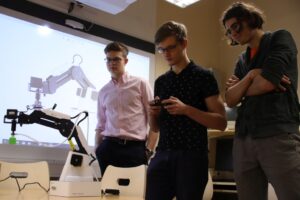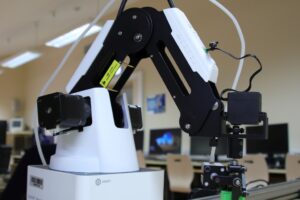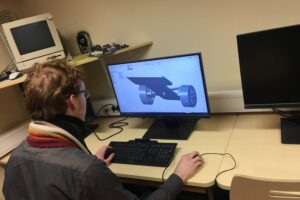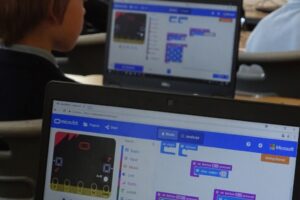Innovation Lab
In September 2019 Tallinn Secondary School of Science began the construction of the engineering laboratory. The laboratory has two main objectives: to develop students’ engineering competences through inquiry-based learning and practical assignments, and to offer other educational institutions in Tallinn the opportunity to experiment with these innovative educational tools and methods in engineering.
We aim to create a laboratory which has suitable conditions for conducting practicals and solving complex problems in mechatronics, programming and engineering. To complement our existing tools (Microbit project boards and Lego Mindstorm kits), the innovation project #EduInnoLab 2.0 allows us to purchase multifunctional robotic arms (Dobots). Dobot is a multifunctional robotic arm to which various tools, manipulators and holders can be attached and which has numerous practical functions such as 3D printing, laser engraving, writing and drawing.
Supervisors: Ahti Pent, Veiko Somelar
The target group of the engineering laboratory is Form 7–12 students in Tallinn Secondary School of Science and other schools in Tallinn. One of the aims of the engineering laboratory is to supplement learning opportunities in secondary school programming courses and offer other physical outputs for programming in addition to creating computer programmes. Another aim is to develop students’ teamworking skills, which is increasingly important in today’s labour market. With Dobots large-scale learning projects can be carried out in which the whole group works towards a common goal while every student has a specific task by which they contribute to the completion of the assignment. Thirdly, these devices enable supervisors to create differentiated tasks to allow for different levels of challenges.
With the engineering laboratory, we foster innovative approaches to teaching and promote creativity, entrepreneurship, development of digital literacy, and students’ individual and social development. The activities conducted in the laboratory support lifelong learning and the modern concept of education:
- student-centered learning – students perform practical tasks by themselves;
- integration – the laboratory supports combining different subjects;
- problem-solving skills – inquiry-based learning is used;
- teamwork – the whole group works towards a common goal while everyone has a specific task in the process.
The learning models and methodologies are compelling, help to integrate theory with practice, teach analytical skills and the use of equipment.
- During the launch phase, the equipment is tested, assignments and learning materials are developed for robotics and programming elective and compulsory courses for senior students. As the devices have numerous functions, it is possible to adapt these tasks for middle school students.
- The equipment in the laboratory can be used to explain the stages of production in the manufacturing industries. Secondary school students have the opportunity to implement projects and conduct experiments for their research projects, especially in Form 11.
- With middle school students, we can use robotic hands in informatics classes to make laser images, pencil drawings and do 3D printing.



